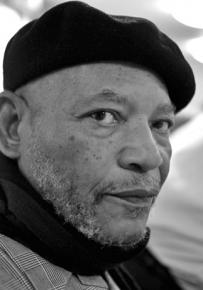Sharing his story for justice
remembers the life of a passionate activist against the death penalty.
WE LOST a freedom fighter, a poet, a friend and a beautiful soul a few days ago in Chicago. Delbert Tibbs passed away in his home on November 23.
Delbert was known to people around the world as a witness to the barbarism of the death penalty system in the U.S. and an activist against it. Delbert spent three years on Florida's death row until he was found innocent and exonerated.
Delbert was born in Mississippi to tenant farmer parents--when he was 12, he and his mother moved to Chicago. While traveling the country in 1974, Delbert was stopped and questioned by police in Florida about the rape of a teenaged woman and the murder of her companion, both of them white.
The description of the suspect from the surviving victim was nearly the opposite of Delbert. The suspect was described as 5-foot-6-inches, with a dark complexion. Delbert had a light complexion and was over 6 feet tall. Delbert had a solid alibi, but that didn't stop prosecutors from putting him on trial, aided by the testimony of a jailhouse snitch who later said he fabricated his claim that Delbert had confessed to him in the hopes of lenient treatment on a rape charge. An all-white jury convicted Delbert after two days of deliberations.

There was a public campaign for Delbert's freedom--folksinger Pete Seeger wrote a song about his case. The Florida Supreme Court eventually reversed his conviction and Delbert was released in 1977. Five years later, the charges against him were officially dropped.
Delbert went on to speak across the country and around the world, often on national and international tours for the anti-death penalty group Witness to Innocence. But Delbert is especially well known and loved by the abolitionist community in Chicago, where he was always ready to share his story and speak out for justice at rallies, protests, public forums and church meetings.
Delbert's fellow Chicago and fellow death row exoneree Darby Tillis remembered his friend this way:
He was just a wonderful man and a gentle giant. He touched a lot of people all across the world. He's been out there speaking for more than 30 years--constantly on the go. He had just returned from a tour. He never said anything to offend anyone. He was humble.
BECAUSE OF what happened to him, and what he saw happening to so many other Black men caught up in the injustice system, Delbert always pointed to the issue of racism in U.S. society. The Final Call quoted him telling a gathering of several dozen people: "If you're Black and grew up in America, you know nothing else has been applied fairly. So why would the death penalty be applied fairly?"
Whenever you would see Delbert, he was ready with warm words and a strong hug. When he told his story in his deep and steady and persuasive voice, he moved people to become more committed opponents of capital punishment. If you want to see Delbert at his persuasive best, watch this segment from the series of short films about innocence and the death penalty called One for Ten.
The creators of the play The Exonerated also featured Delbert, along with five other former death row prisoners, talking about the death penalty and justice in their own words. One of Delbert's speeches goes to the heart of the tough-on-crime hysteria:
I understand why people are afraid. I mean, I do think the world itself can be quite frightening by getting up everyday. I understand, but you can't give in to that. It's like they say in those cowboy pictures: nobody's going to live forever, so if you got to go, then you might as well go being about the highest thing that you can be. And that means learning not to fear other people.
Delbert always had faith in people and thought that when they were mobilized, they could do great things. He felt uplifted when people took his words to heart--one person told him that after hearing him speak, he was inspired to go into public interest law. Delbert said, "It really makes me believe the Great Spirit laid this trip on me so that I could bear witness of this terrible thing we call the death penalty in the U.S."
Delbert's kind soul and powerful words will live on in his poetry and in all of the hearts he touched. Rest in peace, Delbert.


